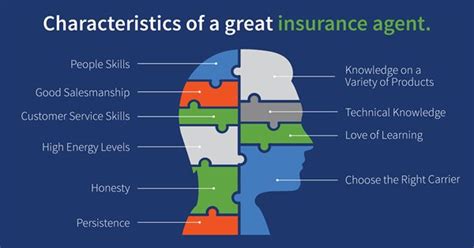Becoming An Insurance Agent

In today's ever-evolving world, financial security is a paramount concern for individuals and families alike. Insurance, an indispensable tool for safeguarding one's financial well-being, plays a pivotal role in this regard. However, the process of choosing and obtaining the right insurance policies can be daunting and complex. This is where insurance agents step in, serving as trusted guides through the intricate web of insurance options.
The journey to becoming an insurance agent is a challenging yet rewarding path, offering the opportunity to build a career that makes a tangible difference in people's lives. It demands a unique blend of knowledge, skills, and a deep sense of responsibility. This comprehensive guide aims to delve into the world of insurance agents, shedding light on the requirements, responsibilities, and rewards associated with this noble profession.
The Role of an Insurance Agent: A Comprehensive Overview

Insurance agents are more than just salespersons; they are financial advisors, educators, and advocates for their clients. Their primary role is to assess the insurance needs of individuals, families, and businesses, and tailor insurance solutions that provide comprehensive coverage while aligning with the client’s financial capabilities.
The job of an insurance agent involves a delicate balance of understanding client requirements, explaining the intricacies of insurance policies, and offering guidance to ensure the best possible protection. This process often entails a deep dive into the client's financial situation, identifying potential risks, and devising strategies to mitigate these risks through appropriate insurance coverage.
Insurance agents are responsible for a wide array of tasks, including:
- Conducting thorough risk assessments to identify potential hazards that might affect the client's financial stability.
- Explaining insurance policies and their terms to clients, ensuring they understand the coverage they're purchasing.
- Providing recommendations on the most suitable insurance policies based on the client's needs and budget.
- Handling insurance applications, including gathering required documentation and ensuring its accuracy.
- Assisting clients during the claims process, advocating for their interests and ensuring they receive the benefits they're entitled to.
- Maintaining up-to-date knowledge of insurance regulations and policies to provide accurate advice.
- Building and nurturing long-term relationships with clients to ensure ongoing support and service.
The Path to Becoming an Insurance Agent: A Step-by-Step Guide

The journey to becoming an insurance agent is a structured process that demands dedication and a commitment to ongoing learning. Here’s a detailed breakdown of the steps involved:
1. Education and Prerequisites
While a specific educational background isn’t always necessary, possessing a high school diploma or its equivalent is typically the minimum requirement. However, a college degree in a related field, such as finance, economics, or business, can provide a solid foundation for a career in insurance.
Certain specialized insurance fields might require more advanced education. For instance, health insurance agents often need a background in healthcare or health administration, while those interested in life insurance may benefit from a degree in finance or a related field.
2. Licensing
One of the most critical steps in becoming an insurance agent is obtaining the necessary licenses. Licensing requirements vary by state and by the type of insurance one intends to sell. Generally, agents must pass an exam that tests their knowledge of insurance principles, regulations, and specific insurance products.
The process often involves studying materials provided by the state insurance department or a reputable insurance education provider. Some states may also require a background check or a certain level of professional experience before issuing a license.
Insurance agents must maintain their licenses through ongoing education. This typically involves completing a certain number of continuing education hours every year or two, depending on the state regulations.
3. Choose Your Niche
The insurance industry offers a wide range of specialties, including health insurance, life insurance, property and casualty insurance, and more. Each specialty comes with its own set of regulations, products, and client demographics.
It's essential to choose a niche that aligns with your interests and strengths. For instance, if you have a background in healthcare or a passion for health and wellness, you might consider specializing in health insurance. Similarly, if you have a strong understanding of investments and financial planning, life insurance could be a good fit.
4. Find a Mentorship or Training Program
Starting a career in insurance can be challenging, and having guidance from experienced professionals can make a significant difference. Many established insurance agencies offer mentorship programs or training sessions for new agents. These programs can provide invaluable insights into the industry, best practices, and strategies for success.
Mentors can offer practical advice on how to build a client base, how to overcome common challenges, and how to navigate the complex world of insurance regulations and products. They can also provide emotional support and motivation during the early stages of your career.
5. Build Your Client Base
The success of an insurance agent largely depends on their ability to build a strong client base. This involves networking, developing relationships with potential clients, and demonstrating your expertise and value.
Some effective strategies for building a client base include:
- Attending industry events and conferences to network with potential clients and colleagues.
- Utilizing social media platforms to showcase your expertise and connect with potential clients.
- Offering free seminars or workshops to educate the public about insurance and establish yourself as a trusted advisor.
- Partnering with local businesses or organizations to provide group insurance plans or employee benefits.
The Rewards of Being an Insurance Agent
The career of an insurance agent offers a unique set of rewards and benefits that can be both financially and personally satisfying.
Financial Rewards
Insurance agents have the potential to earn substantial incomes. While earnings can vary widely based on factors such as experience, location, and niche, the opportunity for high earnings is a significant attraction of this profession.
Most insurance agents work on a commission basis, earning a percentage of the premiums paid by their clients. This means that the more successful an agent is in selling insurance policies, the higher their income potential. Additionally, many agencies offer bonuses and incentives for meeting sales targets, which can further boost earnings.
Some agents also choose to build their own agencies, which can provide even greater financial rewards. Agency owners can earn commissions from the policies sold by their agents, as well as additional income from managing the business.
Personal Satisfaction
Beyond the financial rewards, a career in insurance can offer a deep sense of personal satisfaction. Insurance agents play a vital role in helping people and businesses protect their financial stability and achieve peace of mind.
By providing guidance and education on insurance, agents empower their clients to make informed decisions about their financial future. This can lead to a profound sense of fulfillment, knowing that you've made a positive impact on someone's life.
Furthermore, the relationships built with clients often extend beyond the initial sale. Insurance agents often maintain long-term relationships with their clients, providing ongoing support and advice as their clients' needs evolve. This can lead to a sense of loyalty and trust that is rewarding in itself.
Conclusion
The journey to becoming an insurance agent is an exciting and rewarding path that offers both financial and personal satisfaction. It demands dedication, a commitment to ongoing learning, and a deep sense of responsibility. However, for those who are passionate about helping others and making a difference, a career in insurance can be incredibly fulfilling.
By understanding the role, requirements, and rewards associated with this profession, aspiring insurance agents can make informed decisions about their career path and embark on a journey that can lead to long-term success and satisfaction.
What are the key skills needed to be a successful insurance agent?
+Successful insurance agents often possess a combination of soft and hard skills. Soft skills include excellent communication and interpersonal abilities, empathy, and a strong work ethic. Hard skills involve a deep understanding of insurance products, regulations, and the ability to analyze risk and make recommendations based on client needs.
How long does it typically take to become an insurance agent?
+The timeline can vary depending on factors such as your educational background, the state’s licensing requirements, and your dedication to the process. Generally, it can take anywhere from a few months to a year to become an insurance agent. This includes the time needed to complete educational requirements, study for and pass licensing exams, and find a position with an insurance agency.
What are some challenges that insurance agents face in their career?
+Insurance agents may encounter challenges such as keeping up with constantly evolving insurance regulations and products, managing client expectations, and dealing with potential claims disputes. Additionally, building a client base and maintaining a steady income stream can be challenging, especially in the early stages of one’s career.



